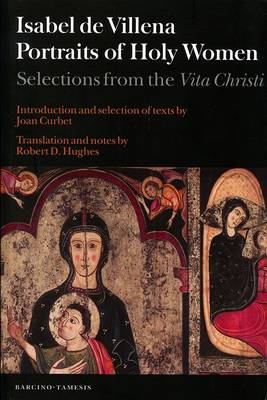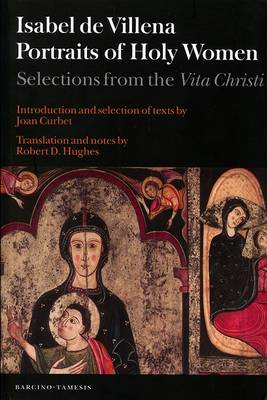
- Afhalen na 1 uur in een winkel met voorraad
- Gratis thuislevering in België vanaf € 30
- Ruim aanbod met 7 miljoen producten
- Afhalen na 1 uur in een winkel met voorraad
- Gratis thuislevering in België vanaf € 30
- Ruim aanbod met 7 miljoen producten
Zoeken
Omschrijving
The Vita Christi, written by the abbess Isabel de Villena, is the only literary work in Catalan to bear the signature of a woman during the Middle Ages. It represents a fascinating re-evaluation of the role women played inthe life of Jesus Christ. The Life of Christ (Vita Christi), written by the abbess Isabel de Villena, is the only literary work to have been preserved in Catalan and to bear the signature of a woman during the Middle Ages. It was composed to provide spiritual direction for the nuns within the community of Poor Clares which Sor (i.e. Sister) Isabel oversaw at the Convent of the Holy Trinity in Valencia.
The work was only able to emerge from obscurity by accident. In 1497 Queen Isabel of Castile, the wife of Ferdinand of Catalonia-Aragon, who had heard news of the book's existence, asked Sor Isabel's successor for a copy. The new Abbess, Sor Aldonça, responded by bringing the work to press.
Queen Isabel's interest in Sor Isabel's book was understandable. The former abbess had been the daughter of the refined and restless Marquess of Villena, and was herself educated at Court, a milieu with which she maintained very positive relations throughout her life. As an abbess, what's more, she carried out important reforms at the convent and became a valued and respected figure within the dynamic cultural world of the Valencia of her day.
Isabelde Villena's Vita Christi has often been interpreted as a response, delivered from the serenity of the cloister, to the misogyny and satire against the female gender emanating from certain books written at that time. Sor Isabel's work is a re-evaluation of the role women played in the life of Jesus Christ, a role at variance with the subsidiary one ascribed to them by the majority of commentators. Published in association with Editorial Barcino, Barcelona.
The work was only able to emerge from obscurity by accident. In 1497 Queen Isabel of Castile, the wife of Ferdinand of Catalonia-Aragon, who had heard news of the book's existence, asked Sor Isabel's successor for a copy. The new Abbess, Sor Aldonça, responded by bringing the work to press.
Queen Isabel's interest in Sor Isabel's book was understandable. The former abbess had been the daughter of the refined and restless Marquess of Villena, and was herself educated at Court, a milieu with which she maintained very positive relations throughout her life. As an abbess, what's more, she carried out important reforms at the convent and became a valued and respected figure within the dynamic cultural world of the Valencia of her day.
Isabelde Villena's Vita Christi has often been interpreted as a response, delivered from the serenity of the cloister, to the misogyny and satire against the female gender emanating from certain books written at that time. Sor Isabel's work is a re-evaluation of the role women played in the life of Jesus Christ, a role at variance with the subsidiary one ascribed to them by the majority of commentators. Published in association with Editorial Barcino, Barcelona.
Specificaties
Betrokkenen
- Auteur(s):
- Uitgeverij:
Inhoud
- Aantal bladzijden:
- 180
- Taal:
- Engels
- Reeks:
- Reeksnummer:
- nr. 56
Eigenschappen
- Productcode (EAN):
- 9781855662599
- Verschijningsdatum:
- 20/06/2013
- Uitvoering:
- Paperback
- Formaat:
- Trade paperback (VS)
- Afmetingen:
- 157 mm x 234 mm
- Gewicht:
- 476 g

Alleen bij Standaard Boekhandel
+ 53 punten op je klantenkaart van Standaard Boekhandel
Beoordelingen
We publiceren alleen reviews die voldoen aan de voorwaarden voor reviews. Bekijk onze voorwaarden voor reviews.











